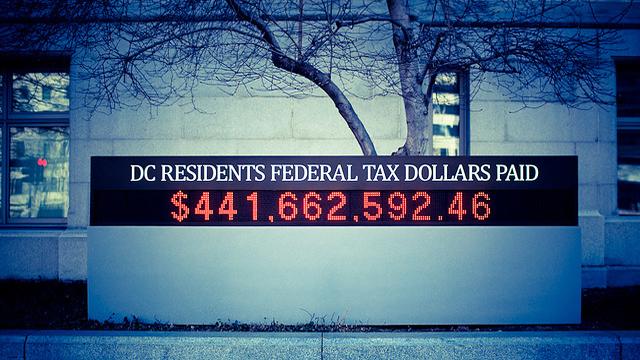
Photo: Spectreman. Taxation without representation.
WASHINGTON, D.C. - The colonists who founded this country fought a revolutionary war against taxation without representation. More than 200 years later, one of the most absurd American ironies is that the people of our capital city pay federal taxes but get no vote in Congress, and are, essentially, colonized.
“We have been conditioned to look at ourselves as slaves and to accept it,” D.C. activist Josephine Butler said in 1994. “We have to be willing to show Congress that as much as they may try to shackle us, we still know how to break loose.”
Butler spoke those words 27 years after D.C. was granted the right to vote for its own mayor and city council and 33 years after D.C. residents were permitted to vote for president. Between 1874 and 1975, U.S. presidents appointed about 100 different commissioners to run our largely black city. All but one was white and all but one was male.
Today D.C. has one non-voting delegate in Congress – Eleanor Holmes Norton (D-DC-At-Large) – and it is the only city that has to pass its new laws and budgets through congressional review. Such review is the duty of the House Oversight Committee – the “overseers,” as one student called them in a recent teach-in. That committee is chaired by Darrell Issa (R-CA), a Republican who represents a district on the other side of the continent. He is also the wealthiest member of Congress, worth hundreds of millions of dollars. Issa, who received 94% of his campaign contributions from outside of his district, successfully called for the National Park Service to forcefully evict the two Occupy DC encampments.
In the context of America’s purported dedication to spreading democracy around the world, it is a telling incongruity that we are the only so-called democracy in the world whose capital is unrepresented in its national legislature. This longstanding injustice and the national lack of awareness inspired several members of Occupy DC to embark on a hunger strike, demanding that Congress grant D.C. full representation and autonomy.
The five members of Occupy the Vote DC took only water for different periods of time, ranging from eight to 25 days. They were joined by solidarity strikers for 24 to 48 hours at a time, including Congressmen Keith Ellison (D-Minn.) and longtime civil rights activist Dick Gregory, among others. This lasted for 51 consecutive days, to symbolize the 51st state that D.C. should be.
“As long-time devotees of the Occupy Movement, we feel that the game is rigged against the 99% of Americans and people across the world – the silencing and overpowering of our voices by the 1% is a form of disenfranchisement,” said one hunger striker. “But we also feel that to exclude 100% of Washingtonians from being represented in government, especially while taxing us, is to commit a direct act of disenfranchisement and colonization.”
Despite this, there are those who remain content to deny the 617,996 residents of Washington, D.C. the same democratic rights they cherish for themselves.
The most common argument against the liberation of D.C. is Article 1, Section 8, Clause 17 of the Constitution, which gives Congress the power “to exercise exclusive legislation in all Cases whatsoever, over such District (not exceeding ten Miles square) as may, by Cession of particular States, and the acceptance of Congress, become the Seat of the Government of the United States.”
However, constitutional scholars have noted that the “Seat of the Government” need only refer to the National Mall and the parts of Capitol Hill where the federal government buildings are located. Since the only requirement is that it be smaller than ten-by-ten miles, what is considered the seat of government could be shrunken down to solely encompass the federal government’s land, thereby withdrawing the blanket of disenfranchising oversight from the rest of the city.
Contrary to popular belief, the vast majority of people in D.C. do not work for the federal government – nor are they even represented in it.
3 WAYS TO SHOW YOUR SUPPORT
- Log in to post comments











